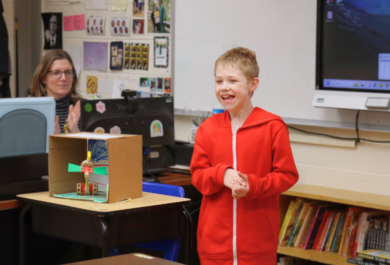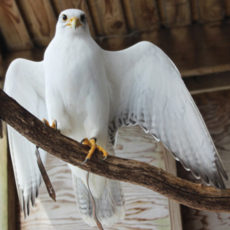Announcements

Green Chimneys School academics are complemented by age-appropriate, therapeutic educational programs offered to all grade levels as part of the weekly class schedule. Many incorporate Green Chimneys’ unique nature-based approach, providing experiential learning and opportunities to develop important skills related to the care of and interaction with animals, plants and the environment. High School students earn 1/4 elective credits for these courses.
The activity goals of the aquatics program are coordination, flexibility, stamina, cardiovascular strength, confidence, increased self-esteem and enjoyment of physical activity in water as a life-supporting skill. Course design encourages water safety, hygiene, healthy teamwork competition, cooperation and fair play. Students are taught swimming skills and develop communication skills as they learn to compete individually.
In art class, the creative process is supported through the teaching of artistic skills, color usage, and perspective, and the development of a personal point of view. Safety, discipline and proper tool and material usage characterize the type of class where self-expression is encouraged through the use of various artistic media. Units are designed to familiarize students with well-known artists, art movements and the role of art in society.
The foundation for each unit in the curriculum is to understand animal behavior and the dependence of domesticated animals on humans for their most basic needs and survival, and learn to recognize the needs of each living creature. Using an interactive and practical approach, students learn responsible animal stewardship by doing and farm class is specifically designed to address the needs of diverse learners through a combination of barn-based education and hands-on activities. The core of this class places an emphasis on Animal-Assisted Activities (AAA) and guided physical and intellectual discovery of sheep, goats, cows, chickens and other farm animal species. Students are encouraged to participate in Farm Showmanship Days, and activities to prepare for these events help students develop an enhanced understanding of the biological and environmental aspects of farm work, learn how to speak publicly, and gain a sense of responsibility while caring for living beings. Families are invited to attend these presentation events.
Through effective classroom activities, this course combines functional knowledge and health education social skills. Functional knowledge is presented in the context of potential risks and consequences of various health-related behaviors. Students consider how information and issues impact their own life, as well as the lives of those around them. Health education social skills include decision-making, communication, refusal skills, and relationship and self-management skills, with the goal of achieving health literacy.
The Green Chimneys Horse Barn offers students the opportunity for individual learning and guided group interaction with equines in a small class setting. This program is offered to 4 students per class each quarter, and participating students can join at least one quarter a year. In our large horse barn and indoor arena, students learn to work in harmony and kindness with horses, ponies and donkeys of all sizes. The goal is for students to discover how equines communicate through unique body language and to learn how to safely interact with these sensitive herd animals. Feeding, grooming, cleaning stalls, leading horses to pasture and other necessary care activities in the barn and paddocks offer physical work and task mastery.
Horticulture and gardening offer experiential opportunities that connect students to plants and important agricultural concepts. The core of the horticulture curriculum revolves around plant anatomy, plant propagation, entomology, and helping students develop healthy relationship with food. Students care for the garden from seed to harvest with a heavy focus on vegetables, herbs, and fruits, and learn about the ecosystem that includes insects and wildlife in our educational garden. Students move into the campus greenhouse during the winter months. Additional goals are to help students discover how plants connect to human health, personal well-being and how working in a garden with peers promotes quality of life and social skills.
The Green Chimneys Library provides students with a venue in which they can become proficient in accessing and benefitting from the intellectual property of society through the use of books, magazines, videos, online access of information and other resources as they steer the course of research and inquiry. This course encourages self-expression, the development of interest areas and the use of research materials in support of other school-based courses and projects
The Life Skills class integrates reading skills, liquid and dry goods measurement, geography, and social studies, building on cooperative group skills that model proper etiquette and behavior in food preparation and dining environments. The course encourages sanitation, health and hygiene, familiarity with culturally diverse foods and healthy eating. Classes are held in a fully functioning teaching kitchen where students gain a working knowledge of the sanitary, safe and effective operation of everyday household appliances such as stoves, mixers, dishwashers and kitchen utensils and learn how to prepare and serve nutritious food in a home-like environment.
Music students learn that performance-based instruction is a productive form of self-expression and communication that can foster group cooperation, individual activity and outreach. Musical instruments and instruction are provided in class and concepts such as rhythm, musical notes and the structure of music and performance skills are practiced. This self-paced course adapts to the interests and choices of individual students while encouraging group cooperation, peer support and appreciation of individual talent.
The Outdoor Education curriculum is designed to promote creative thinking and a greater understanding of the world to instill a commitment to our individual and community responsibility of stewardship. Students learn and understand the basic ecological, sociological and cultural principles needed to be successful in meeting that commitment. The Green Chimneys historic farm property, fondly referred to as the Great Swamp, and the extensive forests and fields surrounding the campus provide a rich site for studying the human relationship to the environment. Outdoor spaces are explored as an environment for leisure activities such as hiking, kayaking, tower climbing and high ropes adventure, skiing, snowboarding, and camping. Students are introduced to complex decision-making related to ecological matters such as recycling after carefully weighing the impact of their actions on the environment, culture, and humanity.
The activity goals of Physical Education include coordination, flexibility, stamina, cardiovascular strength, confidence, and enjoyment of physical activity as a life-supporting skill. Course design promotes healthy competition, cooperation and fair play in a team framework, developing communication skills as well as learning to compete against oneself. Note: Students need to have rubber-soled sneakers.
Students develop essential skills in this class, with the goal of functioning effectively in a sophisticated technological and diverse learning and living environment. Through guided exploration, students in this self-paced, highly supervised class learn how to access various computer-based program applications and the internet and increase typing and research skills through educational games and trial-and-error learning. Time spent practicing the usage of technology in the computer lab builds resourcefulness and self-confidence in written expression as skills are mastered. Students may access and continue work on their projects in a variety of settings by logging into their personal files located on the monitored school student server and accessible to students and staff in the Computer Lab, Classroom and Library.
The Wildlife curriculum provides an immersive experience with native animals and the local woodland habitat, and teaches stewardship for the living environment as a whole. Students develop a sense of place and ownership of nature while exploring the rich local environment and learn that they are connected to animal communities in a larger natural system. Classes participate in the care of over 70 birds, mammals, and reptiles permanently living at our Wildlife Center, exploring steps that they can take to support conservation and habitat preservation. Students also gain firsthand knowledge of the threats to wildlife through study of the injured and rescued birds of prey being cared for on site. The rehabilitation and release of healed hawks, owls, and other species back into their natural habitat is highly celebrated and is always a powerful and emotional learning experience for the students.
Students receive integrated-approach instruction as they use measuring skills, reading, drafting of plans and math to develop a working knowledge about the properties of wood and the steps necessary to turn it into useful or decorative objects. Safety, patience, following directions and group cooperation are the key area skills acquired in this class. Woodshop offers students a chance to practice hand-eye coordination, teaches competence in safe tool usage, and enhances self-confidence through self-expression and the completion of long-term projects.
Work-based learning and skill development is the foundation of the long-established campus “Learn and Earn” program. With the assistance of teachers and social workers, interested students voluntarily sign up for age-appropriate work assignments in various campus locations, including the Farm & Wildlife Center, dining hall, building offices, and Boni-Bel Farm & Country Store. Students work under the guidance and supervision of job coaches on work-based tasks that demand commitment and are designed to mirror those found in a community workplace. This highly sought-after program builds discipline, confidence, and life skills, and establishes the relationship between work (learn) and payment or reward (earn) for students. One half of the money earned through this program is placed into a savings account for each student to be disbursed upon their discharge from Green Chimneys School. Students may keep the other half of their earnings to spend on trips, during special occasions, or at home. The School Counselor also educates and assists eligible students and their families in the process of obtaining working papers, and can provide a letter of recommendation to students who are applying for part time jobs in their community.

Crowned the best for falconry in medieval times, gyrfalcons were once reserved for kings. As the largest falcon in the world, with exquisite plumage ranging from bright white to deep charcoal, gyrs are revered for their powerful skill of flight. Their long wings make hunting waterfowl from 3,000-feet-high a feasible and fantastical feat. This falcon was flown in the sport of falconry for several years.